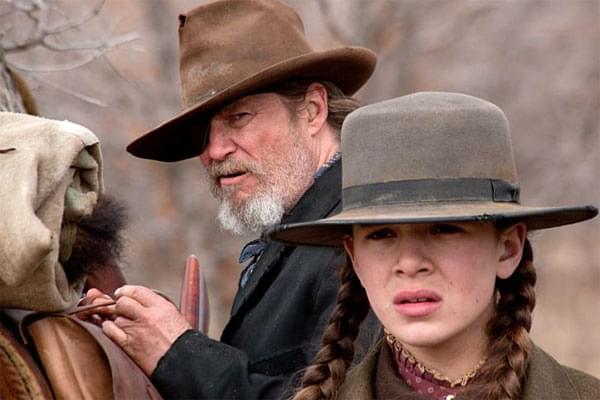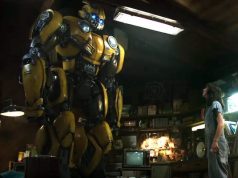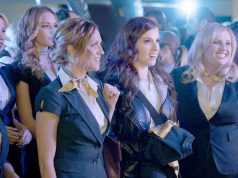
“I do not entertain hypotheticals,” says a man in “True Grit.” “The world as it is is vexing enough.” His world is the American frontier, circa 1875, and his sentiments are probably shared by most of his contemporaries. But life is about to become more vexing as old laws, customs, and means of communication are replaced by new ones. Like many Westerns of the last half-century, “True Grit” depicts a society on the verge of modernization. The new is represented by a headstrong 14-year-old girl named Mattie Ross; the old comes in the form of a drunken, one-eyed U.S. Marshal called Rooster Cogburn.
The 1969 version of this film is mostly famous now for being the source of John Wayne’s only Academy Award. What Joel and Ethan Coen have done is return to Charles Portis’ 1968 novel and create an adaptation that’s darker and more faithful to it. Like most of the Coen brothers’ work, “True Grit” is dryly funny and populated by odd characters, yet it has a shocking and violent undercurrent. Few filmmakers can make coarseness seem as eloquent (and vice versa) as the Coens.
An astonishingly talented 13-year-old newcomer named Hailee Steinfeld plays Mattie Ross, the serious, precocious girl whose father was killed by a coward named Tom Chaney. She has come to Ft. Smith, Ark., to retrieve the body and to seek Chaney’s capture, but the villain has run off to the Indian territories and is thus under the jurisdiction of the U.S. Marshals, who are understaffed and have worse criminals to catch. Refusing to take no for an answer — this will be a running theme with her — Mattie roots out the meanest, most pitiless marshal she can find and offers him a personal reward for bringing Chaney to justice.
That marshal, of course, is Rooster Cogburn, played by Jeff Bridges. (Perhaps out of deference to the Duke, who wore the patch over his left eye, Bridges has it over his right.) Cogburn takes his job seriously and is very good at it. His heavy and frequent drinking does not seem to hinder his ability to capture or kill (usually kill) the bad guys, though certain members of the legal profession take a dim view of his kill-to-capture ratio.
Also in pursuit of Tom Chaney is one Mr. LaBoeuf (Matt Damon), a Texas Ranger tasked with bringing in the scoundrel for killing a state senator. Cogburn knows the territory and LaBoeuf knows Chaney, so the two are willing to put aside the amusing rivalry that apparently exists between U.S. Marshals and Texas Rangers. They both insist it would be foolish for Mattie to join them on their manhunt, but Mattie is unswayed.
The Coens use the characters’ communication styles to highlight their differences. Mattie speaks with impeccable grammar, never using contractions or debasing herself with vulgar slang. When threatened, she drops the name of a fancy lawyer she supposedly has on retainer back home. It seems absurd to use such a tactic on the frontier, and yet it always works. Cogburn, meanwhile, speaks in a guttural voice that often drifts into incomprehensibility, and is known to let his gun do the talking — almost literally at times, as he’ll fire a shot in the air to signal a compatriot, or shoot at targets to demonstrate his superiority. LaBoeuf can talk up a storm, especially when it comes to bragging about the Rangers, then finds himself at a loss when he bites his tongue during a fight and can’t express himself very well thereafter.
There is also some discussion about the difference between things that are inherently wrong and things that are only wrong because society says so. Cogburn, testifying in court about a fugitive he shot, is baffled that it should matter whether he killed the guy or brought him in alive. The idea that it could be “wrong” to gun down criminals is new to his society. Soon enough it will be lawyers, not posses, running everything, and it will no longer be acceptable for a man to do all his communicating with a six-shooter.
Much of the dialogue is straight from the book, yet the tics and idiosyncracies feel Coen-esque. (They did the same thing with Cormac McCarthy’s words in “No Country for Old Men.”) Steinfeld, Bridges, and Damon are all terrific, each one delivering an entertaining performance and seemingly having a great time. In addition, Josh Brolin and Barry Pepper have small but effective turns as the villains.
More than anything else, “True Grit” is fun, in the grand tradition of rip-roaring Westerns. The Coens have been known to treat their subjects with aloofness and ridicule, but not here. In fact, I’d guess they were having a blast putting their signature on a familiar genre with an uncomplicated story and colorful characters. This isn’t the deepest Western or the most thoughtful Coen brothers film, but dang if it isn’t a good time.
B+ (1 hr., 50 min.; )





